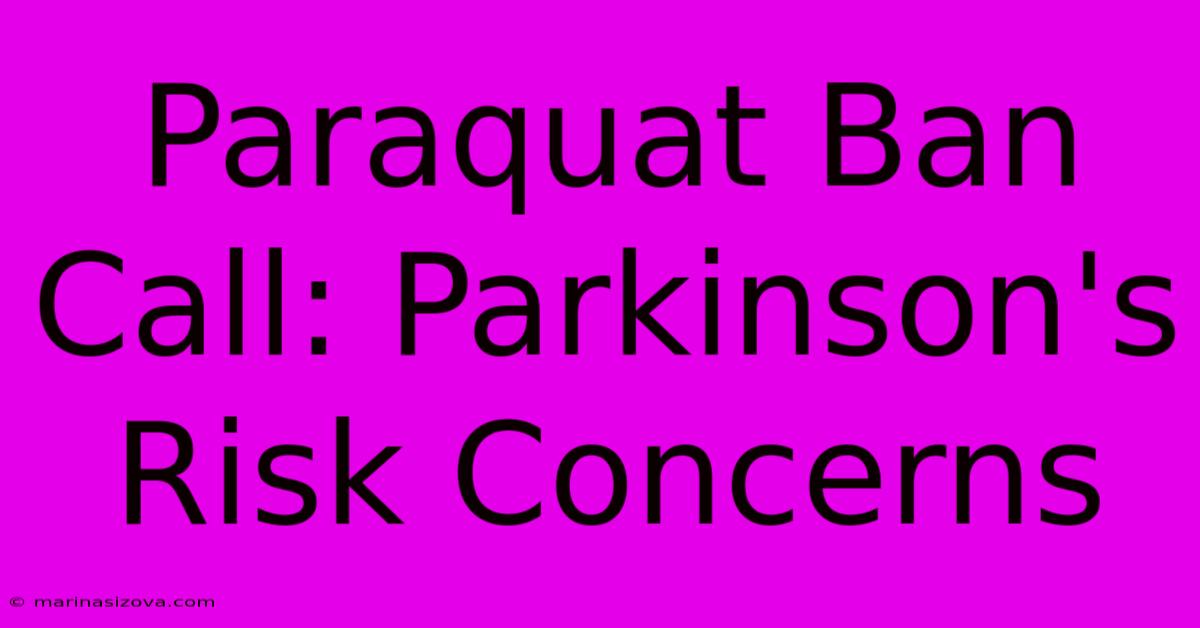Paraquat Ban Call: Parkinson's Risk Concerns

Discover more detailed and exciting information on our website. Click the link below to start your adventure: Visit Best Website. Don't miss out!
Table of Contents
Paraquat Ban Call: Parkinson's Risk Concerns Spark Debate
The call for a global ban on the widely used herbicide paraquat is gaining momentum, fueled by mounting evidence linking its use to an increased risk of Parkinson's disease. This highly controversial issue pits the agricultural benefits of paraquat against the potential health risks it poses, igniting a debate that continues to rage in scientific, regulatory, and public spheres.
Paraquat: A Powerful Herbicide with a Troubled Past
Paraquat is a fast-acting, non-selective herbicide used to control weeds in various crops, including cotton, soybeans, and corn. Its effectiveness stems from its potent ability to disrupt the photosynthetic process in plants, causing them to quickly wither and die. However, this potent chemical has a long and controversial history, drawing scrutiny for its potential toxicity to humans and the environment.
The Link Between Paraquat and Parkinson's Disease
While the precise mechanisms underlying the link between paraquat exposure and Parkinson's disease remain unclear, studies have consistently shown a strong association. Epidemiological studies have linked agricultural workers exposed to paraquat to a significantly elevated risk of developing Parkinson's disease. Furthermore, animal studies have demonstrated that paraquat can induce Parkinson's-like symptoms in rodents.
The key concern lies in paraquat's ability to damage dopamine-producing neurons in the brain, a hallmark characteristic of Parkinson's disease. This damage can manifest in various ways, including oxidative stress, inflammation, and mitochondrial dysfunction.
The Argument for a Paraquat Ban
Advocates for a global ban on paraquat argue that the potential health risks far outweigh the agricultural benefits. They cite the overwhelming evidence linking paraquat exposure to Parkinson's disease, a debilitating neurological disorder that affects millions worldwide. The fact that safer alternatives to paraquat exist further strengthens their position.
Counterarguments and Challenges
Opponents of a ban argue that paraquat remains a valuable tool for farmers, providing effective weed control and contributing to agricultural productivity. They emphasize the need for responsible use and appropriate safety protocols, pointing to the lack of conclusive evidence demonstrating a direct causal link between paraquat and Parkinson's.
They also highlight the potential economic repercussions of a ban, arguing that it could negatively impact food security and the livelihoods of farmers, particularly in developing countries.
The Regulatory Landscape and Future Outlook
The call for a paraquat ban has spurred regulatory action in several countries. In the European Union, paraquat has been banned for non-professional use since 2007. However, it remains widely used in other parts of the world, including the United States, where its future hangs in the balance.
The ongoing scientific research and mounting evidence continue to fuel the debate surrounding paraquat. As the scientific community further investigates the complex link between paraquat and Parkinson's, the regulatory landscape is likely to evolve, potentially leading to stricter regulations or even bans in more countries.
Key Takeaways
- The link between paraquat exposure and Parkinson's disease is a significant public health concern.
- The call for a global ban on paraquat is driven by mounting evidence and a desire to protect human health.
- The issue is complex and involves balancing agricultural needs with potential health risks.
- Ongoing research and regulatory action will shape the future of paraquat use.
The debate surrounding paraquat is far from over, but it underscores the importance of careful consideration of the potential health impacts of widely used chemicals.

Thank you for visiting our website wich cover about Paraquat Ban Call: Parkinson's Risk Concerns. We hope the information provided has been useful to you. Feel free to contact us if you have any questions or need further assistance. See you next time and dont miss to bookmark.
Featured Posts
-
Chelsea Stars One Word Response To Man Utd Transfer
Oct 29, 2024
-
Thirty Seconds To Mars Show Confirmado Em Portugal
Oct 29, 2024
-
Wypadkowa Smierc Auto Spalone 3 Osoby Nie Zyja
Oct 29, 2024
-
Wypadkowe Zdarzenie Auto Wrak 3 Ofiary
Oct 29, 2024
-
Ugur Meleke Bozuk Degilse Tamir Etmeyin Koese Yazisi
Oct 29, 2024
